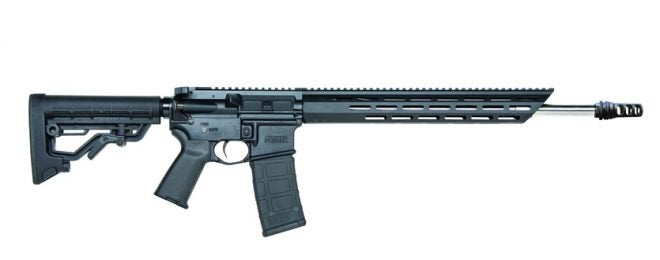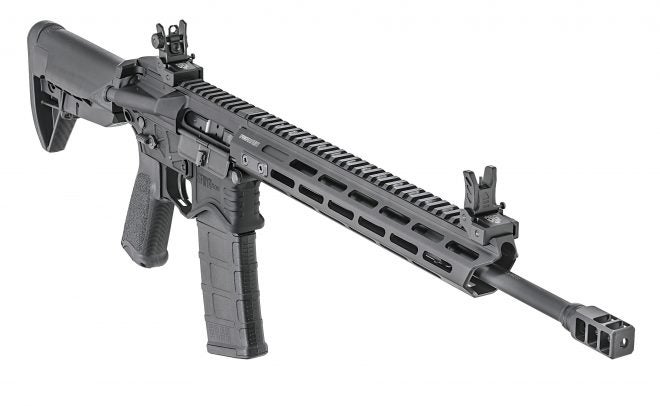Five Myths About AR-15s
Derrek Sigler 08.13.20

There is no other firearm available today that has more misinformation about it floating around than the AR-15. The amount of information that is simply wrong, or flat-out lies regarding these sporting rifles is rather astounding. There are many on the 2nd Amendment side who feel this is due to political and media bias. Is that true? Maybe, but we don’t get into those types of discussions here. Let’s just take a good, hard look at five of the top myths about AR-15s, and the real truth about today’s modern sporting rifle.
What does “AR” really stand for?

We’ve all heard this one before, that “AR” stands for “Assault Rifle.” We all know full well that that is definitely false. “AR” stands for ArmaLite Rifle, coming from the AR designation used in the model and serial numbers used by all firearms produced by the company, which was owned at the time by Eugene Stoner, the inventor of the rifle. ArmaLite was the original manufacturer of the firearm from 1959-1964. The design was sold to Colt firearms, who kept the AR-15 designation on the rifle due to contractual obligations. The term “Assault Rifle” as it is used today associated with AR-15s, is 100% made up and makes anyone with knowledge of this fact laugh when he or she hears it. A rifle cannot commit assault anymore than a screwdriver can. The German military did have a weapon which translated meant “assault rifle,” but those firearms have nothing to do with AR-15s.
The 15 stands for the version of the rifle platform. This was the 15th version of the original design, and therefore became known as the AR-15. The other common variant is the AR-10, a version in the larger 7.62 (.308) caliber. That was the 10th version. The confusion, intended or not, over the name “AR” has led to the creation of the phrase, “Modern Sporting Rifle,” (MSR) which the firearms industry has taken to refer to any rifle using a similar design to the original ArmaLite platforms. I recall one very misinformed politician who made the claim that the 15 designated that the rifle could fire “15 rounds per second.” You’d need a pretty fast finger to accomplish that rather impossible feat, and even then, the mechanics of the rifle wouldn’t allow it.
An AR-15 is NOT a machine gun!
Another common misunderstanding of the AR designation is that it means “Automatic Rifle.” The original design for the AR was to win a contract for the military to replace the M1 Carbine. Yes, the original military version has an automatic option, or select fire, that allows the rifle to fire in three-shot bursts. However, since the civilian version of the rifle was released, the rifle can only fire in semi-automatic, meaning one round goes off for each trigger pull. It is a HUGE myth that the rifle is a machine gun. Simply put – civilians cannot legally own a machine gun without jumping through serious legal hoops (and extreme costs associated with the Class III FFL) and no firearm company currently sells machine guns to civilians. You cannot easily go down to your local sporting goods store and buy a machine gun. It doesn’t work that way. Think you can make it into one? Guess again.
Regardless of what you may have heard, an AR-15 cannot be easily converted into a “machine gun.” The internal differences between the AR-15 and the military M-4 or M-16 are far greater than you may have heard. You would need a serious knowledge of the internal workings of an M-16, as well as a functional machine shop, to even attempt to convert one of the civilian rifles into something it was never intended to be. You’d also have to have a complete disregard for the law, as well as a set of brass ones as big as a battleship. Once you’ve fired your illegal full-auto machine gun, you’d might as well have a seat and wait for the sirens and police to arrive. Trust me – they’re coming.
An AR-15 does, in fact, make a great hunting rifle

A while ago, there was a spirited debate on a social media site, and someone stated that an AR-15 has no use as a hunting rifle. That’s another myth that needs debunking. ARs make excellent hunting rifles. In the smaller calibers, like the 5.56/.223 that is the common caliber they are chambered in, these accurate rifles work amazingly well as varmint and predator hunting rifles. There are many other popular calibers that make the AR-15, and it’s AR-10 predecessor, into stellar big game hunting rifles as well. What makes these rifles exceptional as hunting platforms, too, is the modular capabilities of the firearm. You can change the caliber simply by swapping the upper, making it so you can have a coyote rifle and a deer rifle using the same platform, and a pair of different uppers. There are many variations outside of the standard .223/5.56 calibers that make excellent deer, hog and other big game hunting calibers.
AR-15s are not easier to get than any other legally-owned firearm.

This one makes most every gun owner cringe. Let’s set the record straight – You cannot legally get an AR-15 through the mail. Even firearms ordered online have to be transferred to the owner by a federally-licensed broker, who will perform the same background check (NICS) for an online purchase as they would for an in-person purchase. This also includes the laughable “Gun-Show Loophole” that does not exist. Anyone who has gone to a gun show knows that they are still doing the NICS checks and filing the same paperwork if you are buying from a dealer with an FFL (Private sales do not fall under the NICS system requirements.) Even with the rifle being modular, the receiver is still considered a firearm, and has to go through the same NICS system. If the NICS system has all of the information on a person that it needs, it makes it harder for people with issues to obtain any firearm.
An AR-15 is not a very high-powered rifle.
Another myth we see is that the AR-15’s .223 caliber is so highly powered, it can shoot through walls, blow up cars, etc… Look, we’re not going to make light of the fact that some deranged individuals have used the rifle to do some highly despicable things. There is not one legitimate gun owner who doesn’t feel bad for the victims of some lunatic’s actions. But let’s face some facts here. The .223 and 5.56mm rounds are not very high powered comparatively speaking. These calibers are not the same, but are extremely close. Many AR-15s can fire both without issue, but there are a few differences. The 5.56 is slightly larger, meaning a rifle chambered in true .223 really shouldn’t fire a 5.56 round. Conversely, a rifle chambered in 5,56 can fire .223 without issue. We’re talking about a small, light bullet that will lose velocity and kinetic energy quickly. An AR-15 is not likely to blast rock walls apart easily, or blow cars up, etc. Don’t believe what you see in movies.
The AR-15 is not a “weapon of war” or some evil implement of mass destruction. These are viable sporting rifles that make excellent hunting and target rifles. I’ve had discussions with numerous people who have fallen into the trap of believing the myths associated with this platform. Some have been open minded enough to believe the truth about these rifles. Others have required doing something that I think is a great way to teach people the error of their ways – I take them to the range. I have yet to have a simple person come away from a range experience with the same misguided thoughts they had going in. Of course, taking a new person to the shooting range is something we should all be doing anyways. It is the absolute best way to grow our sports.


